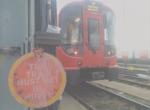This is a briefing that I wrote in 2001, looking at the companies that made up TubeLines when it won the contract for the Jubilee, Northern and Piccadilly Infraco ...
TubeLines is a consortium consisting of the following companies ...
Amey
Amey is responsible for the signals and track in the Paddington area, including signal SN109, which was passed at danger by a Thames Train turbo on 5 October 1999, causing a crash which killed 31 people and injured hundreds. (Evening Standard 7 October 1999) The signal had been passed at danger several times previously, and drivers had complained that it was poorly sighted.
Amey is already a major contractor on the mainline railway which has seen the quality of track and signalling fall below the standard inherited from British Rail. (RMT press release)
Amey had an industrial tribunal claim awarded against it relating to a company called Farr plc. All the employees were made redundant by the administrative receiver when they should have transferred to Amey. The award cost the company £223,000. (UNISON Bargaining Support Group report on Amey Construction)
Following the transfer of Brent property staff to Amey Facilities Management London, local stewards complained of hard style management. Staff were offered a bonus to transfer to AFM contracts. A UNISON branch report pointed out that, contrary to the impression given to staff prior to the transfer, and in contravention of TUPE: (1) union recognition had not happened and they did not participate in collective bargaining (2) union meetings had been refused on AFM premises in working time or even in own time (3) union deductions, which should have been made, had not been paid to UNISON (4) an Equal Opportunities Policies clause had been disregarded. On the first anniversary of the staff transfer, AFM London announced that 17 redundancies were needed and these would be made on the basis of psychometric testing. (UNISON Bargaining Support Group report on Amey Construction)
In 1999, Amey had pre-tax profits of £28.7m (Reuters 22 March 2000): in 1998, it paid its highest-paid director £393,764 (UNISON Bargaining Support Group report on Amey Construction).
Bechtel
In 1999, the Bolivian government sold off Cochabamba’s public water system to a Bechtel subsidiary, ‘Aguas del Tunari’. The details of the deal are secret, with the company claiming the numbers are confidential ‘intellectual property’. Within weeks, the Bechtel subsidiary hit local water users with rate hikes of double and more. Families earning a minimum wage of less than $100 per month were told to pay $20 and more or be cut off. In a popular survey of more than 60,000 residents in March 2000,90% said it was time for the Bechtel subsidiary to go and to return the water system to public control. The price rises provoked big public protests and a ‘city shutdown’, which was met with harsh repression in which a protester was killed. Protest leader Oscar Olivera said in a statement afterwards, “The blood spilled in Cochabamba carries the fingerprints of Bechtel.” (Jim Shultz of the Democracy Center, Pacific News Service,12 April 2000)
Bechtel was co-manager of the clean-up operation after the nuclear accident at Three Mile Island (TMI). The NRC’s Office of Investigations found that Bechtel schemed to avoid making the necessary repairs and that the company “improperly classified” modifications to the plant as “not important to safety” in order to avoid safety controls. When workers such as Senior Safety Start-up Engineer Richard Parks complained that Bechtel and TMI’s owner were deliberately circumventing safety procedures, they were harassed and intimidated. In 1985, the NRC fined the two companies for this abuse. Bechtel also disregarded the health and safety of the clean-up crew at TMI. A 1985 series in the Philadelphia Inquirer revealed the details of the neglect: workers were sent into radioactive sections of the plant without adequate protective clothing or respirators; workers were routinely given clothing that was already contaminated; and equipment intended to detect radiation hazards often malfunctioned. Contamination incidents have been routine since the accident, averaging two a week. (http://www. essential.org/monitor/hyper/issues/1989/10/mm1089_08. html)
Bechtel worked in the US nuclear industry at Hanford in Washington state where all the plutonium for America’s nuclear arsenal was produced from the 1980s. Hanford is now a polluted and dangerous site, with massive toxic waste tanks and huge pools filled with corroding nuclear fuel rods. Bechtel victimised a whistle-blowing employee, Bill Bricker. As safety officer he complained about safety procedures being circumvented, untrained workers operating forklifts in the nuclear reactor, the removal of safety tags and poor tracing of workers’ exposure to radiation. (Campaign Against Tube Privatisation newspaper 2000)
The Government appointed Bechtel as project managers for the Jubilee Line Extension in late 1998. A strike of electricians and mechanical fitters over safety conditions followed immediately afterwards. (Campaign Against Tube Privatisation newspaper 2000)
Hyder
Hyder was formed in 1996 from Welsh Water and SWALEC. By November 1999, it was discussing 600 voluntary redundancies with unions, and feared it would have to make even more. (Guardian 30 November 1999, quoted in UNISON Bargaining Support Group report on Hyder Services)
Hyder cut the number of people employed on its water operations from 3,397 in 1990, when the company was privatised, to 2,744 in 1996. (UNISON Bargaining Support Group report on Hyder Services)
Hyder was fined £50,000 in November 1999 after one of their electricians lost both arms following a 33,000 volt shock at a Swansea substation. The company forgot to put up warning signs on its cables. (Campaign Against Tube Privatisation newspaper 2000)
Welsh Water was placed at number 15 in the Environment Agency’s Hall of Shame, based on fines imposed on companies during 1998. It was fined £15,250 for the following 6 prosecutions (9 charges):
- 17 February 1998 - fined £5,000, with £940 costs, for allowing effluent which had not been disinfected to be discharged from Tenby Waste Water Treatment Plant – in breach of issued Agency consent. Date of offence: 22 April 1997
- 18 February 1998 - fined total £3,000, with £440 costs, after sewage was discharged from a storm overflow into the Gurrey Fach at Llandeilo because of a blockage in the sewer. Date of offence: 14 April 1997.
- 24 April 1998 - fined £2000, with 1,387.50 costs, after a pump failure at its Coslech Treatment Works near Llantrisant caused 4,400 cubic metres of sewage effluent to be discharged into the River Ely over a period of 22 hours. Date of offence: 14 July 1997
- 28 April 1998 - fined £2000, with £1025.50 costs, after a broken sewer on the Ciliau Aeron Industrial Site caused pollution to the Afon Aeron. Date: 27 July 1996
- 30 July 1998 - fined £1,250, with £150 costs, after a mechanical failure at the Tattenhall Waste Water Treatment Works, Cheshire, resulted in sludge entering treatment effluent which was then discharged into the Golbourne Brook. Date of offence: November 1997
- 26 August 1998 - fined £2,000, with £150 costs, after storm tanks at the Caernarfon Sewage Treatment Works overflowed, discharging untreated effluent into the Afon Seiont. Date of offence: 27 November 1997.
(Environment Agency website)
In October 2000, Hyder Utilities (Operations) Ltd was fined £2,500 and Welsh Water Plc £2,000 after around six thousand fish died in a polluted river in August 1999. Welsh Water pleaded guilty to a charge of discharging trade effluent to the Afon Syfynwy, in Pembrokeshire, south west Wales. Hyder Utilities pleaded guilty to causing polluting matter to enter controlled waters, for which it was fined £2,000, and causing waters to be poisonous to fish, for which it was caused £500. (PA News 23 October 2000)
The Office of Water Services (OFWAT) reported the following concerning the performance of Dwr Cymru (Welsh Water) in 1998/99:
- 8,307 written complaints were made to the company,5.8 per 1,000 connections;
- 20,516 connected properties experienced planned and warned supply interruptions of more than six hours;
- 0.54% (1 in 185) of its connected properties experienced unplanned and unwarned supply interruptions of more than six hours;
- 14.5 per 100,000 of its connected properties were flooded by overloaded sewers, and 20.1 flooded by other causes, a performance more than 25% worse than the industry mean (average) - the figures for the previous year had been even worse;
- 51% of its combined sewer overflows were unsatisfactory, the worst figure in the whole industry; an equivalent population of 942,000 was served by unsatisfactory sea outfalls, by far the worst figure in the industry.
(OFWAT 1998/99 Report on Levels of Service for the Water Industry in England and Wales)
In 1998/99, Dwr Cymru had a water leakage rate of 237.8 litres per connected property per day, the highest per-property leakage rate in the water industry. (OFWAT 1998/99 Report on Leakage and Water Efficiency)
In 1999, Hyder made pre-tax profits of £207.7m (£22,138 per employee) and paid its highest-paid director £365,000. (UNISON Bargaining Support Group report on Hyder Services)
Jarvis
Jarvis is responsible for 60% of plain line track renewals and the maintenance of 6,500km of rail infrastructure, and so must bear great responsibility for the deteriorating condition of rail infrastructure. It acquired the Northern Infrastructure Maintenance Company Ltd (NIMCo) from British Rail in June 1996. (UNISON Bargaining Support Group report on Jarvis)
In August 2000, Jarvis Fastline was fined a total of £500,000 for breaches of health and safety regulations following two freight train derailments in 1999. The prosecutions followed investigations by the HSE’s Railway Inspectorate into a derailment on 14 March 1999 at Atlas Curve between Metro Centre station and Dunston station on the Newcastle to Carlisle line and into a derailment on 29 August 1999 near Desborough, Northamptonshire, between Kettering and Market Harborough stations. (PA News 25 August 2000)
London Mayor Ken Livingstone condemned Jarvis for being “Fined under the Health and Safety Act after a worker in a subsidiary was killed in 1993. Prosecuted after potential misrouting of train.” (Hugh Muir 5 August 2000)
Jarvis is cutting back its programme of ‘modern apprenticeships’. (Jarvis plc - Annual Report and Accounts 1999)
Jarvis sees its future business development being in PFI/PPP, which it clearly sees as very profitable. (Jarvis plc - Annual Report and Accounts 1999)
Jarvis has a contract to build Colfox School in Bridport, Dorset. The capital cost is £15.2 million (increased from the initial estimate of £12m), but the contract will be worth £22m to Jarvis. The final contract price was only 2% below the Public Sector Comparator price. (Dexter Whitfield ‘Private ‘Finance Initiative: the commodification and marketisation of education’ Education and Social Justice vol.1 no.2 1999; ‘Schools mortgage their futures’ Labour Research February 1999)
In 1999, Jarvis made pre-tax profits of £34.44m (£5,010 per employee) and paid its Chief Executive, Paris Moayedi, £324,000. (Jarvis plc - Annual Report and Accounts 1999)
- 3967 reads





